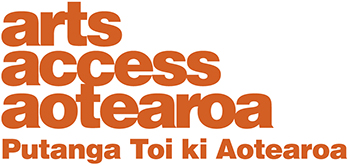The results of Creative New Zealand’s latest survey findings, published in New Zealanders and the Arts—Ko Aotearoa me ōna Toi, are a goldmine. They provide us with benchmarked data we can all use to advocate for the benefits of the arts to Aotearoa New Zealand’s economy, identity, wellbeing and international reputation.
 This research has been conducted every three years since 2005. This means the 2023 findings are based on trends over a significant period of time and are therefore extremely reliable.
This research has been conducted every three years since 2005. This means the 2023 findings are based on trends over a significant period of time and are therefore extremely reliable.
Creative New Zealand says it uses the data to inform its policy, planning and advocacy work. The data is also used “extensively” by local authorities and arts communities.
Arts Access Aotearoa will certainly be using the data to promote the importance of our work with Deaf and disabled artists and communities, creative spaces, performing arts organisations, museums, galleries and prisons.
 I believe these findings will also be of value to Hon Paul Goldsmith, Minister for Arts, Culture and Heritage, who recently called for a national arts and creative sector strategy. Read It’s time for an arts and creative sector strategy
I believe these findings will also be of value to Hon Paul Goldsmith, Minister for Arts, Culture and Heritage, who recently called for a national arts and creative sector strategy. Read It’s time for an arts and creative sector strategy
So, what do the results tell us? Importantly, positive attitudes towards the arts are increasing. In the survey, people spoke about the enjoyment they experience, how the arts help their mental health and wellbeing, shape our identity, and are opportunities for self-expression and connection.
Agreement with the following attitude statements has increased over time.
- The arts help improve New Zealand society: 60% agree, up 8% since 2014.
- The arts help define who we are as New Zealanders: 63% agree, up 11% since 2014.
- The arts contribute positively to our economy: 64% agree, up 12% since 2008.
- The arts should receive public funding: 62% agree, up 13% since 2014
- My community would be poorer without the arts: 53% agree, up 10% since 2020.
In addition, ngā toi Māori (Māori arts) are increasingly embraced by both Māori and the general adult population, with 78% (up 9% since 2014) agreeing that ngā toi Māori is an important way of connecting with their culture / identity.
 And here’s another significant finding for Arts Access Aotearoa: 41% of New Zealanders says the arts are important to their personal wellbeing. This echoes what we have long championed: the transformative power of the arts to nurture mental health and wellbeing.
And here’s another significant finding for Arts Access Aotearoa: 41% of New Zealanders says the arts are important to their personal wellbeing. This echoes what we have long championed: the transformative power of the arts to nurture mental health and wellbeing.
However, survey findings show that accessibility in the arts is still a barrier that needs to be addressed so that more New Zealanders can create, attend and engage with the arts. Some of the key barriers to participation are ticket prices, travel, physical access, a lack of confidence and someone to go with.
These findings underpin our efforts to increase accessibility initiatives so that everyone can enjoy the benefits of creating and experiencing the arts.
The scale of the survey is impressive and means we will have access to a range of reports.
 Specialist reports will be produced for Māori; Pacific peoples; Asian New Zealanders; and Deaf and disabled New Zealanders. There are also 13 regional reports and two city reports.
Specialist reports will be produced for Māori; Pacific peoples; Asian New Zealanders; and Deaf and disabled New Zealanders. There are also 13 regional reports and two city reports.
These specialist reports and formats will be released in July 2024. In addition, a summary of the research will also be prepared in a range of accessible formats, including Plain English Large Print, Audio, Braille, Easy Read and New Zealand Sign Language.
Moving forward, let’s seize this opportunity to harness the potential of the arts to shape Aotearoa’s collective identity, nurture cohesive communities and inspire positive social change.
By elevating the voices and stories of marginalised communities, we can weave a more inclusive tapestry that reflects the richness and diversity of Aotearoa New Zealand.





